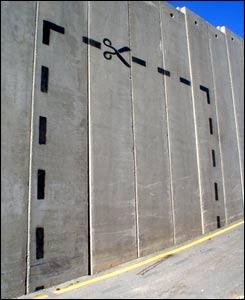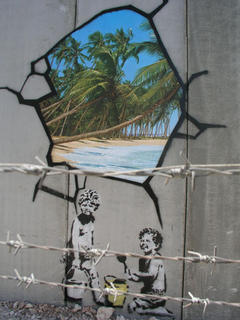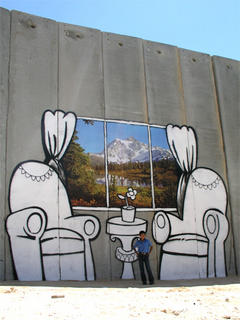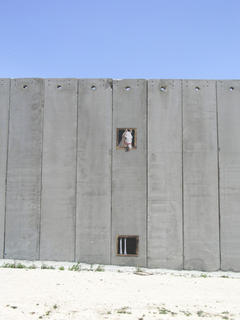Ramadi. Three car bombs exploded in quick succession near U.S. forces in Ramadi, west of Baghdad, in an apparently coordinated strike by insurgents, police and witnesses said. In the first blast, a car blew up as a U.S. convoy passed through the centre of the Sunni city, police said. Minutes later, a suicide truck bomber rammed his vehicle into a building frequently occupied by U.S. troops in an industrial zone on the edge of Ramadi, witnesses said. As U.S. troops arrived, a third bomb, concealed in a car parked near a mosque, went off, a reporter for Reuters near the scene said. There was no immediate word on U.S. or Iraqi casualties.
Najaf. Government-run television showed wild rejoicing in the Shi'ite holy city of Najaf after news of the ruling coalition's plans to force through its charter.
Washington. President George W. Bush, campaigning at home to quell mounting disquiet over the costly occupation of Iraq, said it was a key front in the "war on terror" and he would not bring troops home prematurely:
We will finish the task, he said.
Khan Yunis. Mayor Osman al-Farra revies plans for projects in Gush Katif, abandoned by the Israelis. Farms, a private beach, hotels, homes and a sports stadium are in the planning.
Cairo. Kurds on the road to independence. The adoption of a federal Constitution by Iraq has provoked fears of the spread of "federal fever" to all the Arab countries in the Middle East and beyond where religious minorites or ethnicies feel oppressed.
The federalist demands in Iraq will impact the state "mosaics".... Federalism was never before part of the Arab political vocabulary, said Nabil Abdel Fattah of the al-Ahram Center for Strategic Studies. Meanwhile Jordanian researcher Hassan al-Barari underscores that
the Kurds are working towards secession from Iraq because of their experiences with a central Iraqi state. They find themselves now in an ideal situation. The have an historic opportunity to leave the Iraq orbit due to their relations with the United States, Israel and the West. Neither Syria nor Turkey, which have sizeable Kurdish minorities,
can stop the birth of a Kurdish state on the ruins of Iraq which will be recognized by the United Nations and the international community.
Amman. The group,
Al-Qaeda in Iraq, claimed on several websites that it was behind the rockets fired at US warships in the port of Aqaba. Intelligence experts believe that the extension of al-Zarqawi's group into Jordan is "a grave development for the region."
Sydney. Austrialian Muslims pledge to fight terrorism.
Baghdad. The Chaldean Patriarch Monsignor Emmanuel Delly harshly criticized evangelical proselytism in Iraq.
These evangelists do not wish for the welfare of Iraq nor of Christianity. Delly says that they are plying Iraq's youth with money.
We were here before them. We are apostolic Christians and our origins are here in Iraq. Why are they trying to convert us? Delly also emphasized that Chaldean, Syrian and and Assyrian Christians represent distict enthicities to be recognized by the Constitution.
Paris. French Prime Minister Sarkozy says he will introduct a package of anti-terrorism laws that will provide for video, telephone and computer network surveillance.
Cairo. Egypt says it has arrested most of the suspects in the Sharm al-Sheikh bombings without releasing the number of persons arrested during a dragnet in northern Sinai.
Cairo. Ex-jurist Noomane Gomaa, leader of the neo-Wafd, told Egyptians that he is the only presidential candidate able to let in fresh air into Egyptian politics. Meanwhile, Wafd Vice-Chairman Moustapha Abaza said he expected the usual ballot stuffing and said a free and transparent election would be "
surely an unexpected gift from the Almighty."
Washington. US President George W. Bush called on Sunni Iraqis dissatisfied with the draft of the new Constitution to adopt the text.
Baghdad. Ignoring the complaints of Iraq's Sunnis, Prime Minister Ibrahim Jaafari praised the draft constitution and claimed it was nearly finalized.
Baghdad. Sunni negotiator Saleh al-Motlak told AFP that
the draft Constitution will divide Iraqi society and contains several negative provisions.
Baghdad. President Jalal Talabani has restarted consultations with Iraq's political factions to find a compromise. Kurdish Parliament is also debating its position on the Constitution. Meanwhile, US diplomats continue to press for keeping to the schedule and insist that the Constitution will end the Sunni insurgency.
Washington. Secretary of Defense Donald Rumsfeld said there would be a temporary troop increase before the national referendum on the Constitution scheduled for October 15th.
Riyadh. Saudi Foreign Minister Saud al-Faisal expressed dismay at the "attraction of sectarian divisions" in Iraq.
23:59 Tokyo. The UN says it has made progress in restoring the flow of water through Iraq's marshes and have started restoring the former ecosystem.
23:38 New York. The Metropolitan Transit Authorities has signed a $200 million contract with Lockheed Martin for anti-terrorism surveillance equipment for the NYC transit system.
23:24 Paris. French Foreign Minister Philippe Douste-Blazy says there is
a race against the clock in the political transition of Iraq and calls for acceptance of a constitution that satisfies all political factions. Meanwhile Judge Raëd Jouhi rules that Saddam and other prisoners of the former regime may see their attorneys at any time.
23:23 Ottawa. Canada says it applauds the Iraqi evacuation of Gaza.
23:20 Paris. French Foreign Minister Philippe Douste-Blazy sais that the Gaza evacuation is meaningless without implementing the Road Map.
21:26 Camp Cropper. Saddam Hussein confirms that his legal team has been dismissed and that he will keep just one attorney, Khalil Doulaïmi. More than 2,000 had lawyers volunteered for Saddam Hussein's defense, including Ramsey Clark and the daughter of Muammar Qadhafi.
17:20 Baquba. Seven persons were killed, including two Americans, and twenty wounded, including 10 Americans. A suicide bomber on foot blew himself up inside a "Joint Coordination Center" in Diyala Province.
17:19 Basrah. The bullet-ridden body of General Ibrahim al Mansouri, a former officer in Saddam Hussein's army, was found in a Basrah cemetery
17:07 Iraqi. Suicide bomber blows himself up in the mess hall of the Baquba Province Administration Building. Eight Iraqi police are dead and 11 wounded.
16:10 Washington. Price of oil rises to $66 per barrel.
15:51 Baghdad. A mortar strikes police HQ in Diyala. Four police, including Colonel Hafid Hussein, were killed and 14 wounded.
14:50 Baghdad. Shi'ite-led government on Tueseday ruled out any major change to a draft constitution that parliament looks set to pass this week in the teeth of minority Sunni objections that it could ignite civil war. Sunni leaders, who largely shunned a January election that gave Shi'ites and Kurds control of parliament, said they were mobilising support for a "no" vote in the October referendum.
If it passes, there will be an uprising in the streets, said Sunni negotiator Saleh al-Mutlak.
14:47 Baghdad. The Islamic Party has rejected the draft Constitution presented to Parliament yesterday.
We are opposed to both the spirit and the letter of the text, said a party spokesperson.
14:19 Ramallah. Palestinian President Mahmoud Abbas will travel to Cairo for meetings with Hosni Moubarak concerning the Gaza evacuation.
14:07 Ad Dawr. Hundreds of Sunnis demonstrated against the draft constitution, yelling
Long live the honourable insurgency. Several tribal chieftans and local leaders participated. .
14:05 Fallujah. A US soldier was killed by a roadside bomb.
12:11 London. British police will prepare a report on the death of Jean Charles de Menezes in the Stockwell Tube station.
10:21 Suleimaniyah. The Iraqi Minister for the Environment, Mrs. Narmin Othman, escaped an assassination attempt when her convoy was attacked in Suleimaniyah. Six bodyguards were wounded.
07:32 Baghdad. US Command confirms that a US soldier was killed by a rocket in the capital yesterday afternoon.
02:31 Seattle. An ex-photographer for the US Army threatened to blow up a veterans' office if they did not meet his demands. A police search of his home found weapons, ammunition and a bombmaking manual.














